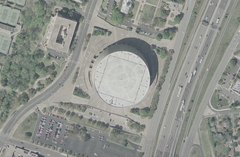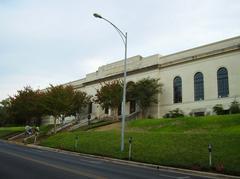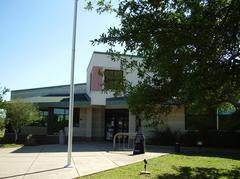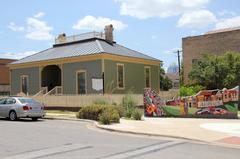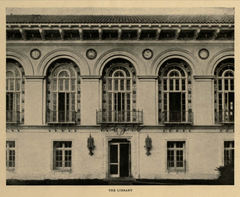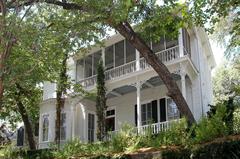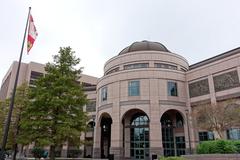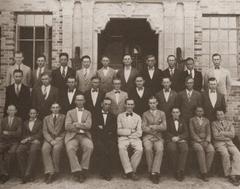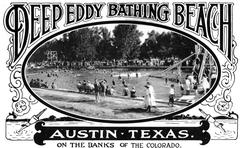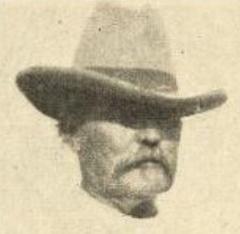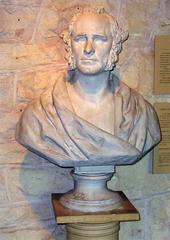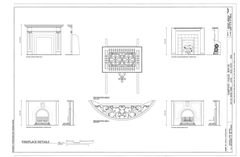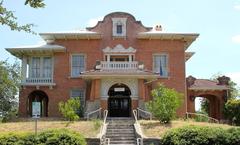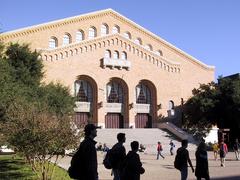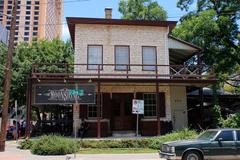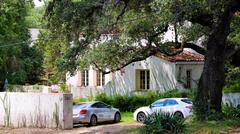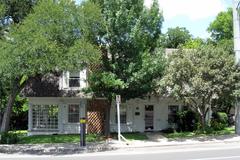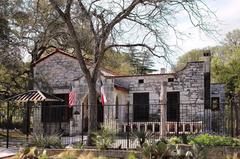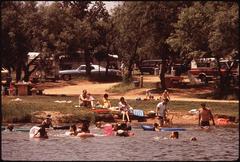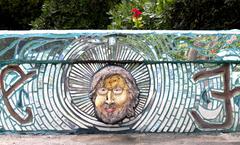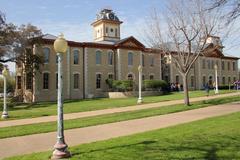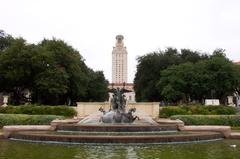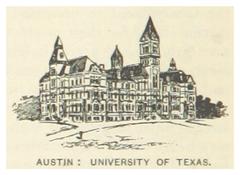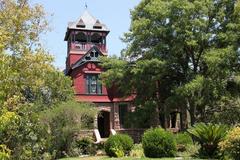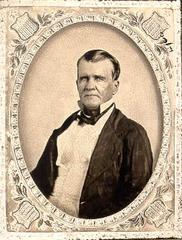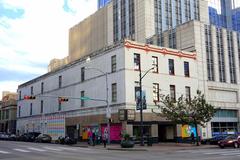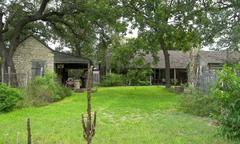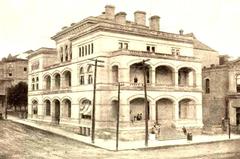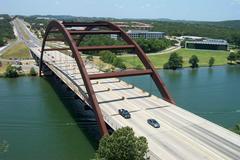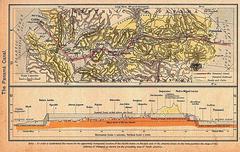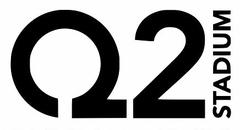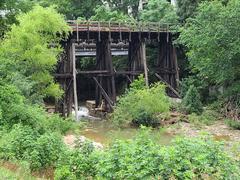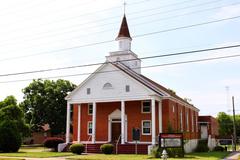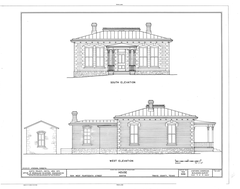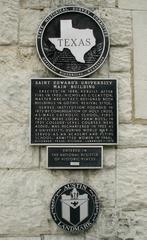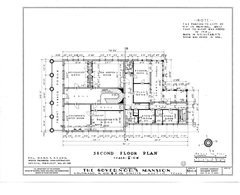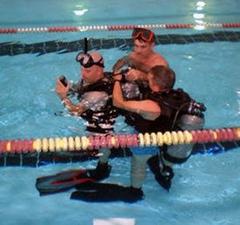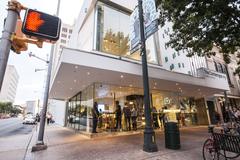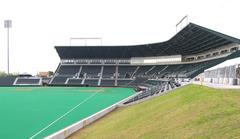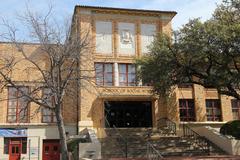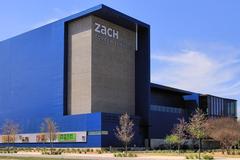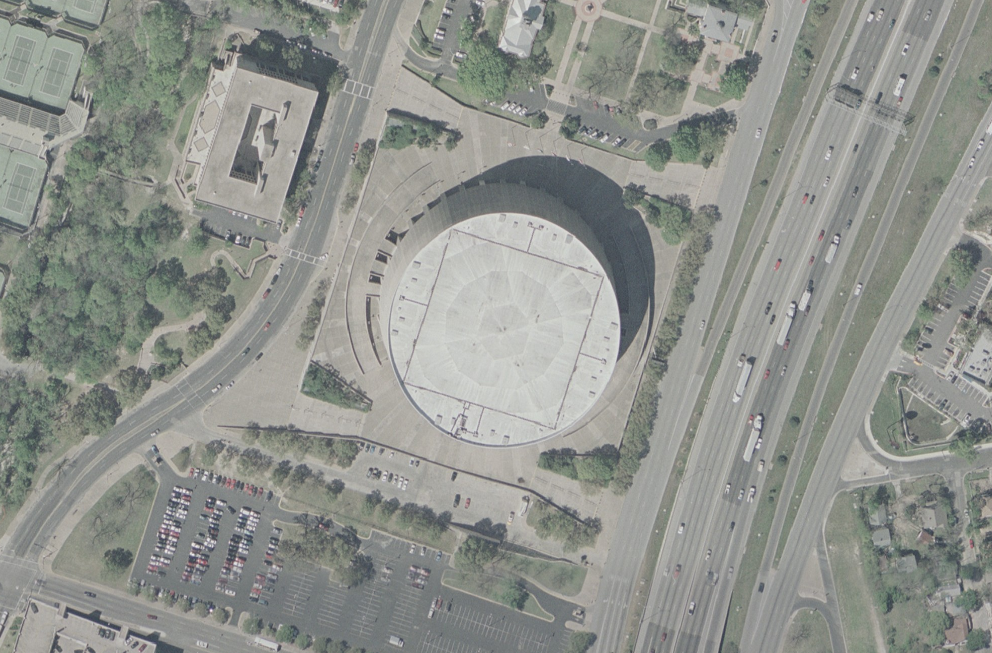
Frank Erwin Center Visiting Hours, Tickets, and Guide to Austin Historical Sites
Date: 14/06/2025
Introduction
The Frank Erwin Center, affectionately known as “The Drum” or “Super Drum,” was a monumental part of Austin’s cultural, sporting, and entertainment landscape for nearly five decades. Located on the University of Texas at Austin campus, it served as a hub for basketball games, major concerts, and community gatherings from 1977 until its closure in 2022 and subsequent demolition in 2024. Though no longer standing, its legacy endures in the city’s memory, with the state-of-the-art Moody Center now carrying forward its tradition of hosting world-class events.
This guide explores the rich history, cultural impact, and architectural significance of the Frank Erwin Center. It also provides practical advice for visitors interested in Austin’s evolving event scene, including how to experience the Moody Center, nearby historic sites, and ways to connect with the legacy of “The Drum.”
Explore further details and updates at Austin Monthly, Alcalde, and Moody Center.
Table of Contents
- About the Frank Erwin Center
- Visiting the Frank Erwin Center Today: What You Need to Know
- The Frank Erwin Center Legacy: Demolition, History, and What to See in Austin
- Frequently Asked Questions (FAQ)
- Additional Austin Attractions
- References
About the Frank Erwin Center
Origins and Construction
Built in response to the need for a modern, large-scale arena, the Frank Erwin Center opened in 1977, replacing the aging Gregory Gymnasium. The venue’s strategic location at the southeastern edge of the University of Texas campus near Interstate 35 made it easily accessible for campus and citywide events. Its distinctive circular design—400 feet in diameter and nearly 100 feet tall—quickly earned it the nicknames “The Drum” and “Super Drum,” making it a recognizable Austin landmark (Austin Monthly).
Naming and Legacy
In 1980, the facility was renamed after Frank C. Erwin Jr., a former UT Board of Regents member. While Erwin was a controversial figure due to his political activity during the late 1960s, his impact on the university was undeniable. Despite mixed feelings about the name, Austinites continued to refer to the venue by its affectionate nicknames (Austin Monthly; TexasLSN).
Role as a Sports and Event Venue
Home to Texas Longhorns men’s and women’s basketball for 45 years, the Frank Erwin Center became synonymous with collegiate sports excellence. It hosted NCAA tournaments, UIL state championships, and high-profile boxing and UFC matches. The arena also welcomed legendary performers—John Denver, David Bowie, Tina Turner, Prince, U2, Madonna, Taylor Swift, and many more—attracting over 26 million visitors during its tenure (TexasLSN; KUT).
Renovations and Modernization
Between 2001 and 2003, a $55 million renovation upgraded seating, audio-visual systems, and luxury suites, ensuring the arena remained a premier destination for events (Austin Monthly).
Transition and Demolition
With the opening of the Moody Center in April 2022, the Frank Erwin Center was retired. Demolition began in August 2023 and concluded in May 2024, clearing the way for the University of Texas’ medical district expansion in partnership with MD Anderson Cancer Center (Community Impact).
Visiting the Frank Erwin Center Today: What You Need to Know
Status, Site Access, and Alternatives
The Frank Erwin Center has been demolished and is not open to visitors. Those interested in the site’s history can explore memorabilia at UT’s Surplus REuse Store or admire the repurposed iconic sign at the new Moody Center.
Where to Watch Texas Longhorns Basketball Now
The Moody Center, located on the UT Austin campus, now hosts Texas Longhorns basketball and major concerts. Tickets can be purchased via the Moody Center official website.
Austin Attractions Near the Former Site
Though the Frank Erwin Center is gone, the surrounding area offers:
- Darrell K Royal–Texas Memorial Stadium: Home to Longhorns football.
- Mike A. Myers Stadium: Soccer and track events nearby.
- Blanton Museum of Art: Renowned for its diverse art collections.
- LBJ Presidential Library: A deep dive into American history.
- Texas State Capitol: Tours available daily.
- Lady Bird Lake: Urban trails for walking and biking.
Accessibility at New Venues
The Moody Center and other UT venues provide full ADA-compliant accessibility, including wheelchair seating, assistive listening devices, and accessible restrooms.
The Frank Erwin Center Legacy: Demolition, History, and What to See in Austin
Demolition Methods and Sustainability
Controlled Deconstruction
Given its central location near busy medical and academic buildings, the Frank Erwin Center was dismantled using a meticulous “reverse engineering” process rather than implosion. Workers removed the roof, interior elements, and finally the steel structure in sections, minimizing noise, dust, and disruptions (SpawGlass; FOX 7 Austin).
Sustainability and Material Recovery
More than 80% of the building’s materials were recycled or reused, including 4,000 tons of steel and 135,000 tons of concrete. Salvaged items like stadium seats and basketball goals were made available at UT’s Surplus REuse Store (ATXtoday; FOX 7 Austin).
Research and Environmental Impact
UT’s engineering department used the demolition as a research opportunity, collecting data to refine sustainable demolition practices for future projects (Texas Connect).
Cultural Significance and Community Memories
For nearly 50 years, the Erwin Center was Austin’s arena for sports, music, and major events, playing host to graduations, family shows, and concerts that defined generations. Its presence shaped Austin’s reputation as a leading cultural city (Alcalde).
Enduring Legacy and Future Impact
The Erwin Center’s demolition set a new standard for sustainable building removal in Austin. The site is now part of UT’s growing medical district, while the Moody Center continues to anchor the city’s event scene. Memorabilia and the iconic sign keep the spirit of “The Drum” alive (Community Impact; ATXtoday).
Practical Visitor Information
Can I Visit the Frank Erwin Center?
No. The Frank Erwin Center has been demolished. For major events, visit the Moody Center on campus.
Where to Find Memorabilia
Select items from the Erwin Center, such as stadium seats, are available for purchase at the UT Surplus REuse Store at the J.J. Pickle Research Campus:
- Location: 10100 Burnet Road, Building 137, Austin, TX 78758
- Hours: Monday–Friday, 8 a.m.–5 p.m.
Moody Center Visitor Information
- Address: 202 East Dean Keeton Street, Austin, TX 78712
- Event Schedules and Tickets: Moody Center
- Accessibility: Fully accessible; accommodations available upon request
Austin Historical Sites
- LBJ Presidential Library
- Blanton Museum of Art
- Texas State Capitol
- Lady Bird Lake
Frequently Asked Questions (FAQ)
Q: Can I still visit the Frank Erwin Center?
A: No, it was demolished in 2024. The Moody Center is now Austin’s premier arena.
Q: Where are Texas Longhorns basketball games held?
A: At the Moody Center.
Q: Are there tours related to the Erwin Center?
A: No tours of the former site, but UT campus tours may include historical context.
Q: Where can I find memorabilia?
A: At the UT Surplus REuse Store.
Q: What’s replacing the Frank Erwin Center?
A: A new medical complex in collaboration with MD Anderson Cancer Center.
Additional Austin Attractions
Summary and Visiting Tips
Although the Frank Erwin Center no longer stands, its influence on Austin’s cultural and sporting life is indelible. The Moody Center now provides a modern, accessible venue for events, while the surrounding campus and city offer a wealth of historical and entertainment attractions. For memorabilia, visit the UT Surplus REuse Store, and for upcoming events, check the Moody Center website. Leverage public transport or rideshare for ease of access, and explore Austin’s museums and trails to round out your visit.
References
- Austin Monthly
- Alcalde
- TexasLSN
- KUT
- CBS Austin
- CultureMap Austin
- SpawGlass
- ATXtoday
- FOX 7 Austin
- Community Impact
- Texas Connect
- Moody Center
For the latest updates and event information, consider downloading the Audiala app. Explore Austin’s vibrant history and dynamic culture—plan your visit with confidence!
